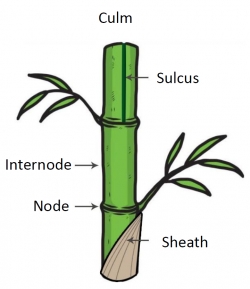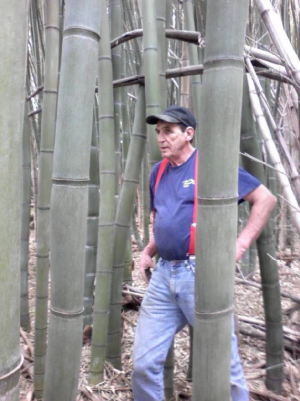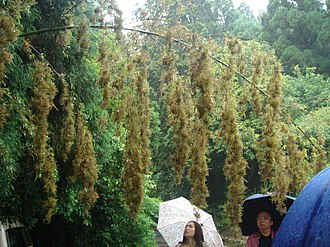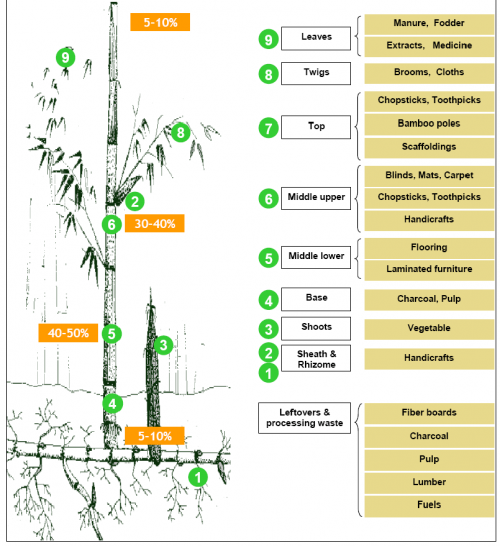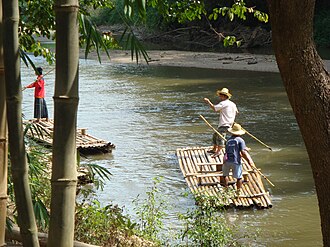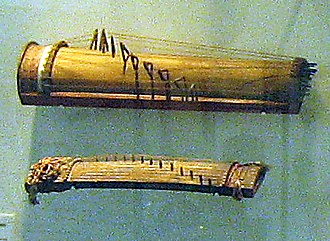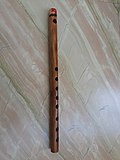Difference between revisions of "AY Honors/Bamboo Craft/Answer Key"
(+ Regional Honor: Bamboo Craft) |
(Marked this version for translation) |
||
| Line 1: | Line 1: | ||
<languages /><br /> | <languages /><br /> | ||
| − | <noinclude><translate></noinclude> | + | <noinclude><translate><!--T:1--> |
| + | </noinclude> | ||
| + | <!--T:2--> | ||
{{honor_desc | {{honor_desc | ||
|stage=00 | |stage=00 | ||
| Line 13: | Line 15: | ||
}} | }} | ||
| − | ==1. How is bamboo classified scientifically?== | + | ==1. How is bamboo classified scientifically?== <!--T:3--> |
| + | <!--T:4--> | ||
Bamboo belongs to the grass family Gramineae (also called Poaceae), subfamily Bambusoideae. There are about 60 to 70 genera and over 1200 species in the world of bamboo. The bamboo plant is a fast growing giant grass with woody stems. It is an evergreen that grow all year round. | Bamboo belongs to the grass family Gramineae (also called Poaceae), subfamily Bambusoideae. There are about 60 to 70 genera and over 1200 species in the world of bamboo. The bamboo plant is a fast growing giant grass with woody stems. It is an evergreen that grow all year round. | ||
| + | <!--T:5--> | ||
According to the [[w:Guinness_World_Records|Guinness Book of World’s Records]], bamboo is the fastest growing plant on earth. Although it does not identify a particular species, they report a growth rate of 35 inches a day. Other sources claim that bamboo can grow more than a meter in a day. | According to the [[w:Guinness_World_Records|Guinness Book of World’s Records]], bamboo is the fastest growing plant on earth. Although it does not identify a particular species, they report a growth rate of 35 inches a day. Other sources claim that bamboo can grow more than a meter in a day. | ||
| − | ==2. Name the parts of a bamboo plant.== | + | ==2. Name the parts of a bamboo plant.== <!--T:6--> |
| + | <!--T:7--> | ||
[[File:Parts of bamboo.png|250px]] | [[File:Parts of bamboo.png|250px]] | ||
| − | ==3. Under what condition does the bamboo plant grow best?== | + | ==3. Under what condition does the bamboo plant grow best?== <!--T:8--> |
| + | <!--T:9--> | ||
Bamboo grows in both tropical and temperate climates in Asia, on islands in the Indian and Pacific Oceans, and also in Africa and South America. It requires a fertile moisture retentive soil that doesn’t get waterlogged. It will grow well in most soil except alkaline soils, dry desert and marsh. Only a few species can grow in fairly cold weather that is below 20 degree Celsius. | Bamboo grows in both tropical and temperate climates in Asia, on islands in the Indian and Pacific Oceans, and also in Africa and South America. It requires a fertile moisture retentive soil that doesn’t get waterlogged. It will grow well in most soil except alkaline soils, dry desert and marsh. Only a few species can grow in fairly cold weather that is below 20 degree Celsius. | ||
| + | <!--T:10--> | ||
The adaptability of the bamboo is admirable as you can find them growing in plains, hilly regions, and even high altitude mountainous areas. | The adaptability of the bamboo is admirable as you can find them growing in plains, hilly regions, and even high altitude mountainous areas. | ||
| − | ==4. How high can the bamboo plant grow?== | + | ==4. How high can the bamboo plant grow?== <!--T:11--> |
| + | <!--T:12--> | ||
The giant bamboo species can reach a height of 20 to 40 meters (130 feet). The culms of some bamboo species grow as quickly as 1 foot or 0.3 meters per day. Some | The giant bamboo species can reach a height of 20 to 40 meters (130 feet). The culms of some bamboo species grow as quickly as 1 foot or 0.3 meters per day. Some | ||
are capable of growing 2 feet (24 inches or 60 cm) or more per day. | are capable of growing 2 feet (24 inches or 60 cm) or more per day. | ||
| + | <!--T:13--> | ||
[[File:Giant bamboo with person.png|300px]] | [[File:Giant bamboo with person.png|300px]] | ||
| − | ==5. How often does the bamboo plant flower?== | + | ==5. How often does the bamboo plant flower?== <!--T:14--> |
| + | <!--T:15--> | ||
Most bamboos rarely flower and they produce seeds only after 12 120 years of growth and only once in their lifetime. In fact, many bamboos only flower at intervals as long as 65 or 120 years. | Most bamboos rarely flower and they produce seeds only after 12 120 years of growth and only once in their lifetime. In fact, many bamboos only flower at intervals as long as 65 or 120 years. | ||
| + | <!--T:16--> | ||
[[File:BambooFlowering.jpg|thumb|left|Bamboo flowering]]{{clear}} | [[File:BambooFlowering.jpg|thumb|left|Bamboo flowering]]{{clear}} | ||
| − | ==6. What are the special qualities of the bamboo plant that have inspired many artists and poets in their works of art?== | + | ==6. What are the special qualities of the bamboo plant that have inspired many artists and poets in their works of art?== <!--T:17--> |
| + | <!--T:18--> | ||
Bamboo stands for elasticity, resilience, endurance and tenacity (strength). The bamboo stem bends in the breeze but does not break. The leaves are moved by the wind but do not fall. The plant always survives and conquers even a storm. | Bamboo stands for elasticity, resilience, endurance and tenacity (strength). The bamboo stem bends in the breeze but does not break. The leaves are moved by the wind but do not fall. The plant always survives and conquers even a storm. | ||
| + | <!--T:19--> | ||
The plant reminds us of the need to compromise when it is necessary, to yield for the moment but eventually to go forward unbroken from all opposition. | The plant reminds us of the need to compromise when it is necessary, to yield for the moment but eventually to go forward unbroken from all opposition. | ||
| + | <!--T:20--> | ||
In the Chinese culture, the bamboo is a symbol of modest virtue because of its humble droopy leaves and empty culm (stem). | In the Chinese culture, the bamboo is a symbol of modest virtue because of its humble droopy leaves and empty culm (stem). | ||
| + | <!--T:21--> | ||
[[File:Xia Chang - Bamboo in Wind - 1989.235.1 - Metropolitan Museum of Art.jpg|thumb|left|Bamboo in Wind - Metropolitan Museum of Art]]{{clear}} | [[File:Xia Chang - Bamboo in Wind - 1989.235.1 - Metropolitan Museum of Art.jpg|thumb|left|Bamboo in Wind - Metropolitan Museum of Art]]{{clear}} | ||
| − | ==7. What are the different uses of bamboo?== | + | ==7. What are the different uses of bamboo?== <!--T:22--> |
| + | <!--T:23--> | ||
[[File:Uses of bamboo.png|500px|Different uses of bamboo]] | [[File:Uses of bamboo.png|500px|Different uses of bamboo]] | ||
| + | <!--T:24--> | ||
Almost every part of the bamboo can beused either as food, fodder, medicine, paper, fuel, lumber or to be made into useful objects. Seeds are eaten as grain and the young shoots of the some bamboos are eaten, especially in East Asian cuisines. The raw leaves are a fodder for livestock. | Almost every part of the bamboo can beused either as food, fodder, medicine, paper, fuel, lumber or to be made into useful objects. Seeds are eaten as grain and the young shoots of the some bamboos are eaten, especially in East Asian cuisines. The raw leaves are a fodder for livestock. | ||
| + | <!--T:25--> | ||
The Panda bear feeds exclusively on bamboo. | The Panda bear feeds exclusively on bamboo. | ||
[[File:Giant panda eating bamboo.jpg|300px|left|Giant panda eating bamboo]]{{clear}} | [[File:Giant panda eating bamboo.jpg|300px|left|Giant panda eating bamboo]]{{clear}} | ||
| + | <!--T:26--> | ||
The pulped fibres are used to make fine quality paper. | The pulped fibres are used to make fine quality paper. | ||
| + | <!--T:27--> | ||
Bamboo can be made into charcoal. Bamboo charcoal comes from pieces of bamboo plants, harvested after at least five years, and burned in ovens at temperatures ranging from 800 to 1200 °C. | Bamboo can be made into charcoal. Bamboo charcoal comes from pieces of bamboo plants, harvested after at least five years, and burned in ovens at temperatures ranging from 800 to 1200 °C. | ||
| + | <!--T:28--> | ||
The jointed stems of bamboo provide materials for houses and rafts. | The jointed stems of bamboo provide materials for houses and rafts. | ||
[[File:Bamboo raft.jpg|300px|left|Bamboo raft]]{{clear}} | [[File:Bamboo raft.jpg|300px|left|Bamboo raft]]{{clear}} | ||
| + | <!--T:29--> | ||
The hollow quality of the bamboo is ideal for making wind instruments like the flute and Sompoton, as well as percussion instruments like the Angklung. | The hollow quality of the bamboo is ideal for making wind instruments like the flute and Sompoton, as well as percussion instruments like the Angklung. | ||
[[File:Chinese half-tube bamboo zithers.jpg|300px|left|Chinese half-tube bamboo zithers]]{{clear}} | [[File:Chinese half-tube bamboo zithers.jpg|300px|left|Chinese half-tube bamboo zithers]]{{clear}} | ||
| + | <!--T:30--> | ||
Bamboo rods are often used to fishing poles. | Bamboo rods are often used to fishing poles. | ||
| − | ==8. What are some of the tools needed in working with bamboo?== | + | ==8. What are some of the tools needed in working with bamboo?== <!--T:31--> |
| + | <!--T:32--> | ||
Because bamboo is tough and durable, it needs to be handled properly with the right tools like axes, saws , coping saws and splitters. Sandpaper is needed to polish off the sharp edges of cut bamboo so as to prevent injury. Glue will be necessary to join different parts of the bamboo together. A drill will be needed to make any items that have holes in it especially when making a flute. | Because bamboo is tough and durable, it needs to be handled properly with the right tools like axes, saws , coping saws and splitters. Sandpaper is needed to polish off the sharp edges of cut bamboo so as to prevent injury. Glue will be necessary to join different parts of the bamboo together. A drill will be needed to make any items that have holes in it especially when making a flute. | ||
| − | ==9. What are the hazards involved when working with bamboo?== | + | ==9. What are the hazards involved when working with bamboo?== <!--T:33--> |
| + | <!--T:34--> | ||
When bamboo is split open, it can be very sharp at the edges and they cut easily. Bamboo dust can cause irritation to the eyes. Upon skin contact, it may also cause allergic contact dermatitis in sensitized individuals. | When bamboo is split open, it can be very sharp at the edges and they cut easily. Bamboo dust can cause irritation to the eyes. Upon skin contact, it may also cause allergic contact dermatitis in sensitized individuals. | ||
| + | <!--T:35--> | ||
Upon inhalation, bamboo dust may also cause nasal obstruction and dryness as well as irritation leading to coughing, sneezing, wheezing and sinusitis. It may also aggravate pre-existing respiratory conditions or allergies. | Upon inhalation, bamboo dust may also cause nasal obstruction and dryness as well as irritation leading to coughing, sneezing, wheezing and sinusitis. It may also aggravate pre-existing respiratory conditions or allergies. | ||
| − | ==10. Make four different bamboo craft items from four of the following categories (all four items must NOT be from the same category):== | + | ==10. Make four different bamboo craft items from four of the following categories (all four items must NOT be from the same category):== <!--T:36--> |
| − | ===● A decorative item. Example: candle holder, picture frame, flower pot holder (planter), water wheel, wind chime=== | + | ===● A decorative item. Example: candle holder, picture frame, flower pot holder (planter), water wheel, wind chime=== <!--T:37--> |
| − | ===● A kitchen utensil item. Example: cup, ladle, spoon, butter knife, basket, tea cup, mug, mat, tray, pot holder, chopsticks, food cover=== | + | ===● A kitchen utensil item. Example: cup, ladle, spoon, butter knife, basket, tea cup, mug, mat, tray, pot holder, chopsticks, food cover=== <!--T:38--> |
| − | ===● A stationery item. Example: letter opener, pencil container, coin container=== | + | ===● A stationery item. Example: letter opener, pencil container, coin container=== <!--T:39--> |
| − | ===● A musical instrument. Example: flute, whistle, rattler, xylophone, percussion instrument=== | + | ===● A musical instrument. Example: flute, whistle, rattler, xylophone, percussion instrument=== <!--T:40--> |
| − | ===● A piece of furniture. Example: chair, stool, table, divider, bar set=== | + | ===● A piece of furniture. Example: chair, stool, table, divider, bar set=== <!--T:41--> |
| − | ===● A utility item. Example: back scratcher, clothes hanger, cloth peg, lamp shade, rope ladder, basket, hat, identification tag=== | + | ===● A utility item. Example: back scratcher, clothes hanger, cloth peg, lamp shade, rope ladder, basket, hat, identification tag=== <!--T:42--> |
| − | ===● A toy item. Example: miniature furniture, animals, plane, car=== | + | ===● A toy item. Example: miniature furniture, animals, plane, car=== <!--T:43--> |
| + | <!--T:44--> | ||
{{clear}} | {{clear}} | ||
| + | <!--T:45--> | ||
<gallery Caption="Different Bamboo Crafts" align=center> | <gallery Caption="Different Bamboo Crafts" align=center> | ||
File:The Bamboo Cups and table.JPG|Cups and table | File:The Bamboo Cups and table.JPG|Cups and table | ||
| Line 116: | Line 144: | ||
</gallery> | </gallery> | ||
| − | ==References== | + | ==References== <!--T:46--> |
| + | <!--T:47--> | ||
[[Category:Adventist Youth Honors Answer Book|{{SUBPAGENAME}}]] | [[Category:Adventist Youth Honors Answer Book|{{SUBPAGENAME}}]] | ||
[[Category:Adventist Youth Honors Answer Book/noindex]] | [[Category:Adventist Youth Honors Answer Book/noindex]] | ||
[[Category:Adventist Youth Honors Answer Book/Regional|{{#titleparts:{{PAGENAME}}|1|3}}]] | [[Category:Adventist Youth Honors Answer Book/Regional|{{#titleparts:{{PAGENAME}}|1|3}}]] | ||
<noinclude></translate></noinclude> | <noinclude></translate></noinclude> | ||
Revision as of 21:47, 1 June 2020
1. How is bamboo classified scientifically?
Bamboo belongs to the grass family Gramineae (also called Poaceae), subfamily Bambusoideae. There are about 60 to 70 genera and over 1200 species in the world of bamboo. The bamboo plant is a fast growing giant grass with woody stems. It is an evergreen that grow all year round.
According to the Guinness Book of World’s Records, bamboo is the fastest growing plant on earth. Although it does not identify a particular species, they report a growth rate of 35 inches a day. Other sources claim that bamboo can grow more than a meter in a day.
2. Name the parts of a bamboo plant.
3. Under what condition does the bamboo plant grow best?
Bamboo grows in both tropical and temperate climates in Asia, on islands in the Indian and Pacific Oceans, and also in Africa and South America. It requires a fertile moisture retentive soil that doesn’t get waterlogged. It will grow well in most soil except alkaline soils, dry desert and marsh. Only a few species can grow in fairly cold weather that is below 20 degree Celsius.
The adaptability of the bamboo is admirable as you can find them growing in plains, hilly regions, and even high altitude mountainous areas.
4. How high can the bamboo plant grow?
The giant bamboo species can reach a height of 20 to 40 meters (130 feet). The culms of some bamboo species grow as quickly as 1 foot or 0.3 meters per day. Some are capable of growing 2 feet (24 inches or 60 cm) or more per day.
5. How often does the bamboo plant flower?
Most bamboos rarely flower and they produce seeds only after 12 120 years of growth and only once in their lifetime. In fact, many bamboos only flower at intervals as long as 65 or 120 years.
6. What are the special qualities of the bamboo plant that have inspired many artists and poets in their works of art?
Bamboo stands for elasticity, resilience, endurance and tenacity (strength). The bamboo stem bends in the breeze but does not break. The leaves are moved by the wind but do not fall. The plant always survives and conquers even a storm.
The plant reminds us of the need to compromise when it is necessary, to yield for the moment but eventually to go forward unbroken from all opposition.
In the Chinese culture, the bamboo is a symbol of modest virtue because of its humble droopy leaves and empty culm (stem).
7. What are the different uses of bamboo?
Almost every part of the bamboo can beused either as food, fodder, medicine, paper, fuel, lumber or to be made into useful objects. Seeds are eaten as grain and the young shoots of the some bamboos are eaten, especially in East Asian cuisines. The raw leaves are a fodder for livestock.
The Panda bear feeds exclusively on bamboo.
The pulped fibres are used to make fine quality paper.
Bamboo can be made into charcoal. Bamboo charcoal comes from pieces of bamboo plants, harvested after at least five years, and burned in ovens at temperatures ranging from 800 to 1200 °C.
The jointed stems of bamboo provide materials for houses and rafts.
The hollow quality of the bamboo is ideal for making wind instruments like the flute and Sompoton, as well as percussion instruments like the Angklung.
Bamboo rods are often used to fishing poles.
8. What are some of the tools needed in working with bamboo?
Because bamboo is tough and durable, it needs to be handled properly with the right tools like axes, saws , coping saws and splitters. Sandpaper is needed to polish off the sharp edges of cut bamboo so as to prevent injury. Glue will be necessary to join different parts of the bamboo together. A drill will be needed to make any items that have holes in it especially when making a flute.
9. What are the hazards involved when working with bamboo?
When bamboo is split open, it can be very sharp at the edges and they cut easily. Bamboo dust can cause irritation to the eyes. Upon skin contact, it may also cause allergic contact dermatitis in sensitized individuals.
Upon inhalation, bamboo dust may also cause nasal obstruction and dryness as well as irritation leading to coughing, sneezing, wheezing and sinusitis. It may also aggravate pre-existing respiratory conditions or allergies.
10. Make four different bamboo craft items from four of the following categories (all four items must NOT be from the same category):
● A decorative item. Example: candle holder, picture frame, flower pot holder (planter), water wheel, wind chime
● A kitchen utensil item. Example: cup, ladle, spoon, butter knife, basket, tea cup, mug, mat, tray, pot holder, chopsticks, food cover
● A stationery item. Example: letter opener, pencil container, coin container
● A musical instrument. Example: flute, whistle, rattler, xylophone, percussion instrument
● A piece of furniture. Example: chair, stool, table, divider, bar set
● A utility item. Example: back scratcher, clothes hanger, cloth peg, lamp shade, rope ladder, basket, hat, identification tag
● A toy item. Example: miniature furniture, animals, plane, car
- Different Bamboo Crafts
